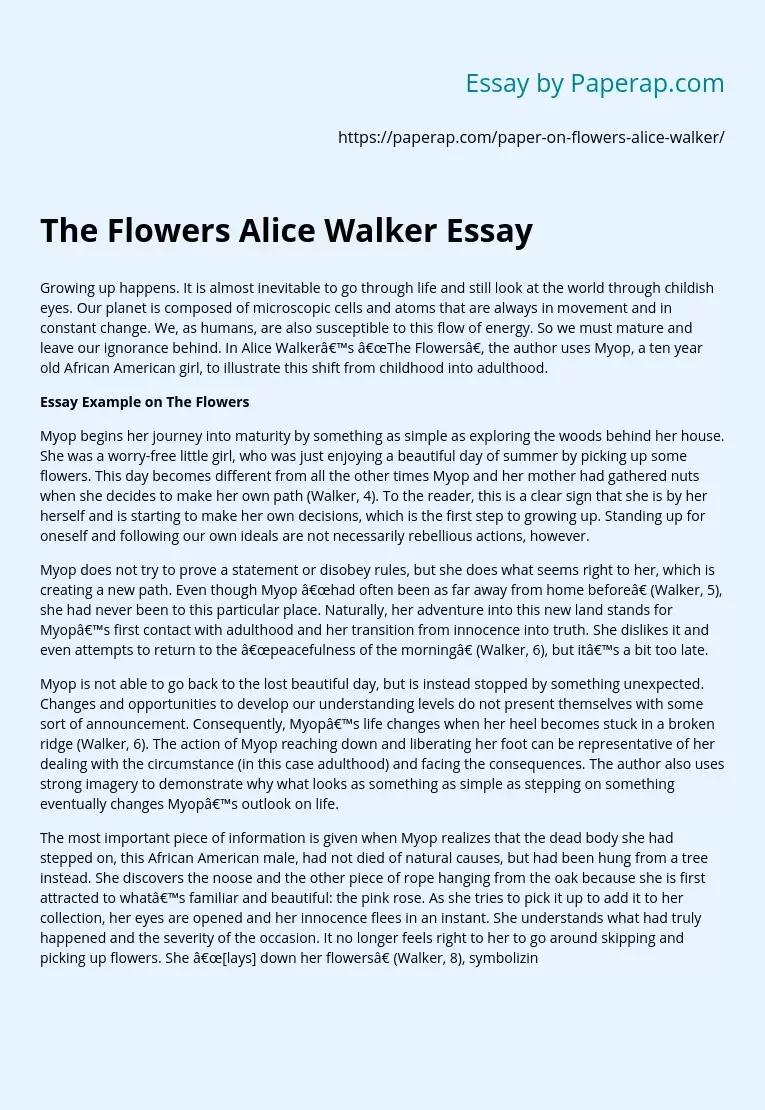The Flowers Alice Walker Essay
Growing up happens. It is almost inevitable to go through life and still look at the world through childish eyes. Our planet is composed of microscopic cells and atoms that are always in movement and in constant change. We, as humans, are also susceptible to this flow of energy. So we must mature and leave our ignorance behind. In Alice Walker’s “The Flowers”, the author uses Myop, a ten year old African American girl, to illustrate this shift from childhood into adulthood.
Essay Example on The Flowers
Myop begins her journey into maturity by something as simple as exploring the woods behind her house. She was a worry-free little girl, who was just enjoying a beautiful day of summer by picking up some flowers. This day becomes different from all the other times Myop and her mother had gathered nuts when she decides to make her own path (Walker, 4). To the reader, this is a clear sign that she is by her herself and is starting to make her own decisions, which is the first step to growing up.
Standing up for oneself and following our own ideals are not necessarily rebellious actions, however.
Myop does not try to prove a statement or disobey rules, but she does what seems right to her, which is creating a new path. Even though Myop “had often been as far away from home before” (Walker, 5), she had never been to this particular place. Naturally, her adventure into this new land stands for Myop’s first contact with adulthood and her transition from innocence into truth.
She dislikes it and even attempts to return to the “peacefulness of the morning” (Walker, 6), but it’s a bit too late.
Myop is not able to go back to the lost beautiful day, but is instead stopped by something unexpected. Changes and opportunities to develop our understanding levels do not present themselves with some sort of announcement. Consequently, Myop’s life changes when her heel becomes stuck in a broken ridge (Walker, 6). The action of Myop reaching down and liberating her foot can be representative of her dealing with the circumstance (in this case adulthood) and facing the consequences. The author also uses strong imagery to demonstrate why what looks as something as simple as stepping on something eventually changes Myop’s outlook on life.
The most important piece of information is given when Myop realizes that the dead body she had stepped on, this African American male, had not died of natural causes, but had been hung from a tree instead. She discovers the noose and the other piece of rope hanging from the oak because she is first attracted to what’s familiar and beautiful: the pink rose. As she tries to pick it up to add it to her collection, her eyes are opened and her innocence flees in an instant. She understands what had truly happened and the severity of the occasion. It no longer feels right to her to go around skipping and picking up flowers. She “[lays] down her flowers” (Walker, 8), symbolizing the loss of purity and fairy-tale reality. She lays down everything she knew and she finally acknowledges truth.
Life is mysterious and the most decisive events happen very unexpectedly. It does not wait for perfect timing and it does not discriminate because of age or gender. We are constantly thrown into unknown directions and forced to react. The day that Myop took that walk through the forest her mind was opened to a new reality that had been foreign to her. She was obligated to lose her sweet ignorance, and the things that seemed fulfilling before lost their beauty.
The Flowers Alice Walker Essay. (2019, Nov 27). Retrieved from https://paperap.com/paper-on-flowers-alice-walker/

